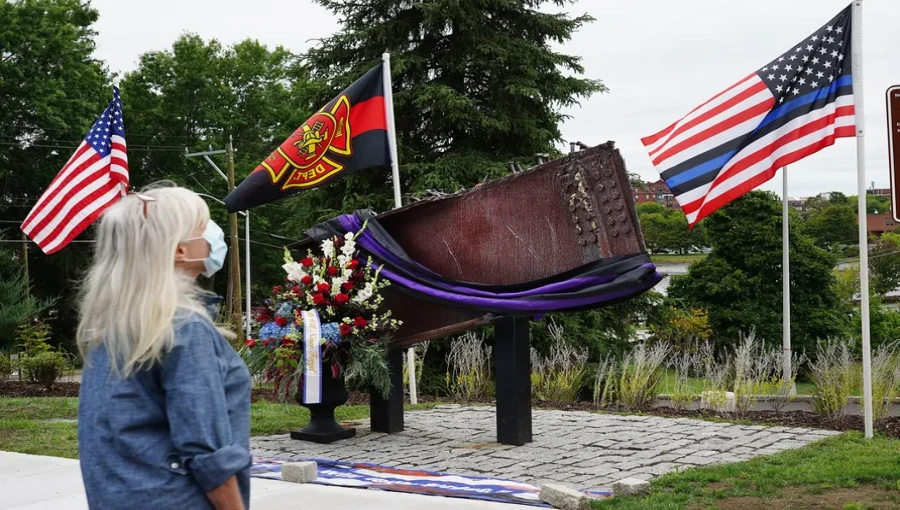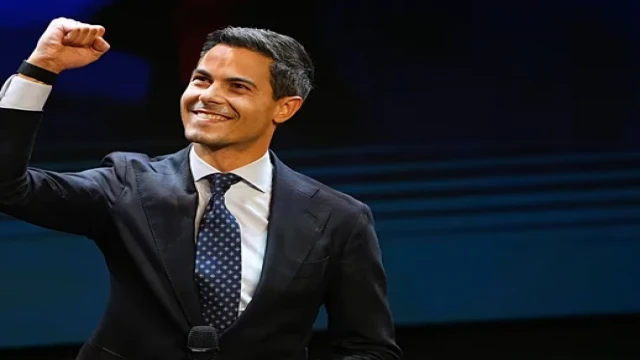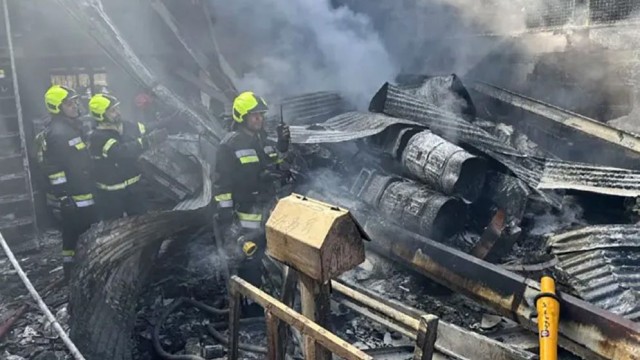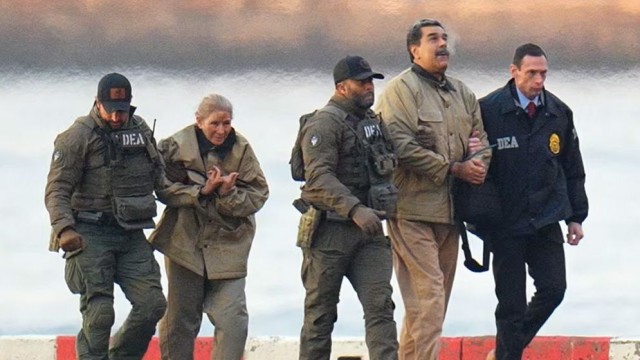Guantanamo Bay, Cuba, Nov 08, (V7N) – A military judge ruled Wednesday that the plea agreements made between the U.S. government and the alleged masterminds behind the 9/11 terror attacks and two of their accomplices are valid, a decision that could allow the men to avoid the death penalty in exchange for life sentences.
Air Force Col. Matthew McCall, the judge overseeing the proceedings, determined that Defense Secretary Lloyd Austin did not have the authority to invalidate the agreements that had been reached between the prosecution and the accused terrorists earlier this year. The plea deals, which were negotiated in hopes of resolving one of the longest-running legal cases in U.S. history, have been highly controversial and met with legal challenges.
The three men involved in the case—Khalid Sheikh Mohammed, the alleged mastermind of the 9/11 attacks, and his two top lieutenants, Walid bin Attash and Mustafa al-Hawsawi—had agreed to plead guilty to charges including the murder of 2,976 people in exchange for taking the death penalty off the table.
Khalid Sheikh Mohammed, widely recognized as the "principal architect" of the 9/11 attacks, has been in U.S. custody since 2003. Along with his co-defendants, he was subjected to extensive interrogation techniques, including waterboarding, while in CIA custody. The three men have been held at Guantanamo Bay for nearly two decades and face the possibility of a military trial. However, the ruling on Wednesday by Col. McCall has opened the door to a resolution that could prevent a death sentence.
Plea Deals and Pentagon's Interference
The plea agreements, which had been negotiated and approved by Brig. Gen. Susan K. Escallier, a retired Army general appointed by the Department of Defense to oversee military commissions, initially promised the defendants a chance to avoid death sentences in exchange for guilty pleas. This marked a significant step in a case that had stalled for years, with the U.S. government aiming to resolve the prosecution of the individuals behind the 9/11 attacks.
However, the deals quickly faced resistance from senior officials, including Defense Secretary Lloyd Austin. On August 2, Austin announced that he had voided the agreements, stating that he had determined the decision to enter into the plea deals was too significant to rest solely with the officer overseeing the military commissions. He argued that such a decision should fall under his purview.
In a memo, Austin wrote to Brig. Gen. Escallier: "I have determined that, in light of the significance of the decision to enter into pre-trial agreements with the accused in the above-referenced case, responsibility for such a decision should rest with me." Austin’s move to revoke the plea deals raised concerns over the authority of military judges and the legal process, prompting a series of legal challenges.
Judge McCall's Ruling
In his ruling, Col. McCall rejected the Pentagon's attempt to void the plea agreements, asserting that Austin did not have the legal authority to override the agreements made by Escallier. McCall stated that the prosecution failed to provide legal justification for Austin’s action, specifically questioning whether any law or regulation gave the Defense Secretary the power to "withdraw" Escallier’s authority to approve the deals.
“The Prosecution did not cite, and the Commission did not find, any source of law authorizing the Secretary of Defense to ‘withdraw’ Ms. Escallier’s authority to enter into a PTA (pretrial agreement),” McCall’s ruling read, according to the legal news site Lawdragon. This decision reinforces the autonomy of the military commissions system and the authority of military judges to make determinations regarding plea deals, regardless of the involvement of higher-ranking officials.
McCall’s decision is significant in the context of the long-running legal saga surrounding the accused 9/11 plotters, and it may pave the way for a resolution to a case that has been dragging on for more than two decades.
Family Reactions to Plea Deals
The plea agreements have been met with mixed reactions, especially among the families of the 9/11 victims. While some victims’ families support the plea deals, which would guarantee life sentences for the defendants, others are adamantly opposed, insisting that the accused men should face a trial and the possibility of the death penalty.
One of the primary benefits of the plea agreements, as outlined by the Department of Defense, is that they would allow the victims’ families to provide victim impact statements at the sentencing hearing next year. These statements would give family members an opportunity to address the court directly, sharing how the attacks have affected their lives.
Additionally, the plea deals would offer victims’ families the rare opportunity to ask the accused men questions about their roles in the attacks and the motivations behind them. This was considered a significant factor in negotiations, as many family members have long sought answers from the men responsible for the tragedy.
The families’ perspectives are split on the issue. Some believe the plea deal provides closure and ensures that the defendants will spend the rest of their lives in prison, while others feel that a trial with the possibility of the death penalty would bring the perpetrators to justice in a way that a plea agreement cannot.
Legal Challenges and Future Proceedings
The ruling on Wednesday is likely to reignite debate over the best course of action for prosecuting those responsible for the 9/11 attacks. With the plea deals still standing, the three defendants could avoid the death penalty, but they would still face life sentences in a maximum-security U.S. prison.
It remains unclear whether the Pentagon will appeal Col. McCall’s ruling or take further action to block the plea agreements. Pentagon spokesperson Maj. Gen. Pat Ryder said that the department is reviewing the decision, but he did not provide further details. The government's response could influence the direction of the case, as any appeal or further legal action could extend the already lengthy process even further.
For now, the legal battle continues, with the three men still facing prosecution in Guantanamo Bay. While the plea agreements have created a path toward a potential resolution, they have also highlighted the challenges of prosecuting individuals accused of orchestrating one of the deadliest attacks in U.S. history. The case, which has been marred by delays, political controversies, and legal hurdles, is likely to remain in the public eye for some time.
The Legacy of 9/11
The legal proceedings against Khalid Sheikh Mohammed and his co-defendants are part of a broader national reckoning with the events of September 11, 2001, and the long-lasting effects of that day on the United States and the world. For nearly two decades, the U.S. government has pursued justice for the 2,976 victims of the attacks, navigating a complicated legal process that has seen multiple changes in policy, law, and leadership.
Whether the plea deals ultimately stand or whether the case goes to trial, the legal and moral questions surrounding the prosecution of the 9/11 plotters will continue to resonate with the American public. The outcome of this case, as well as the families’ reactions, will undoubtedly shape the legacy of the attacks and the ongoing search for justice for the victims.
Conclusion
The military judge’s ruling that the plea agreements for the 9/11 plotters remain valid has reopened the possibility that Khalid Sheikh Mohammed and his two co-defendants could avoid the death penalty in exchange for life sentences. The decision has sparked mixed reactions, particularly from the families of 9/11 victims, and is likely to prompt further legal challenges. As the case progresses, the question of how best to bring justice to those responsible for the 9/11 attacks will remain a point of contention in the United States.
END/NYC/SMA/































Comment: